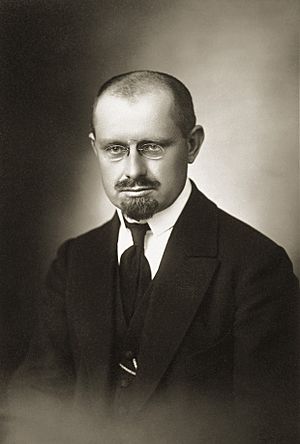Aleksandras Stulginskis facts for kids
Quick facts for kids
Aleksandras Stulginskis
|
|
|---|---|
 |
|
| 2nd President of Lithuania | |
| In office June 19, 1920 – June 7, 1926 |
|
| Preceded by | Antanas Smetona |
| Succeeded by | Kazys Grinius |
| Acting President of Lithuania | |
| In office December 19, 1926 – December 19, 1926 |
|
| Preceded by | Jonas Staugaitis |
| Succeeded by | Antanas Smetona |
| Personal details | |
| Born | February 26, 1885 Kutaliai, Kovno Governorate, Russian Empire |
| Died | September 22, 1969 (aged 84) Kaunas, Lithuanian SSR, Soviet Union |
| Nationality | Lithuanian |
| Political party | Lithuanian Christian Democratic Party |
Aleksandras Stulginskis (born February 26, 1885 – died September 22, 1969) was a very important Lithuanian politician. He served as the second President of Lithuania from 1920 to 1926. He also briefly acted as President again in 1926. This happened after a military coup, which was led by his predecessor, Antanas Smetona. The coup removed Stulginskis's successor, Kazys Grinius, and brought Smetona back to power.
Contents
Early Life and Education
Aleksandras Stulginskis began his studies to become a priest in Kaunas, Lithuania. He continued his studies in Innsbruck, Austria. However, he later decided that he did not want to be a priest.
Instead, he chose to study Agricultural Sciences. He went to the University of Halle in Germany. He finished his studies in 1913 and then returned to Lithuania. Back home, he started working as a farmer. He also wrote many articles about farming for Lithuanian newspapers. In 1918, he began publishing two journals: Ūkininkas ("Farmer") and Ūkininko kalendorius ("Farmer's Calendar").
Political Career and Independence
During World War I, Aleksandras Stulginskis moved to Vilnius. He was one of the people who helped start the Lithuanian Christian Democratic Party. In 1917, he became the head of its main committee. He also signed a special letter to President Woodrow Wilson of the United States. This letter asked the U.S. to recognize Lithuania as an independent country.
Stulginskis believed Lithuania should be friends with the Entente countries. This was different from the views of Antanas Smetona. Stulginskis also helped organize the Vilnius Conference. After this conference, he was chosen to be a member of the Council of Lithuania.
On February 16, 1918, he signed the Act of Independence of Lithuania. This document declared Lithuania's independence. Stulginskis strongly supported the idea of Lithuania being a democratic republic. He was against the idea of Lithuania having a king.
After Lithuania became independent, Stulginskis played a key role. He helped organize the national army. This army was needed to defend the country. It protected Lithuania from attacks by the Bolsheviks and Poles.
Leadership Roles
Aleksandras Stulginskis served as a minister many times in the new Lithuanian government. From May 1920 to 1922, he was the Speaker of the Constituent Assembly of Lithuania. Because of this role, he also acted as the president of the republic during that time.
From 1922 to 1926, he officially served as the second President of Lithuania. Later, from 1926 to 1927, Stulginskis was the Speaker of the Seimas, which is Lithuania's parliament.
Later Life and Imprisonment
In 1927, Aleksandras Stulginskis decided to leave politics. He went back to working on his farm. However, his peaceful life did not last. In 1941, during World War II, Soviet authorities arrested him and his wife.
They were sent to forced labor camps, known as gulags. Stulginskis was sent to the Krasnoyarsk region in Siberia. His wife was sent to the Komi area. After the war, in 1952, the Soviet government officially sentenced him. They gave him 25 years in prison for his political views in pre-war Lithuania.
After Joseph Stalin died in 1956, Stulginskis was released from prison. He was even allowed to leave the Soviet Union. But he chose not to emigrate. Instead, he returned to the Lithuanian SSR. Aleksandras Stulginskis settled in Kaunas. He passed away there on September 22, 1969, at the age of 84. He was the last living person who had signed the Act of Independence of Lithuania.
Images for kids
See Also
 In Spanish: Aleksandras Stulginskis para niños
In Spanish: Aleksandras Stulginskis para niños
 | Percy Lavon Julian |
 | Katherine Johnson |
 | George Washington Carver |
 | Annie Easley |


